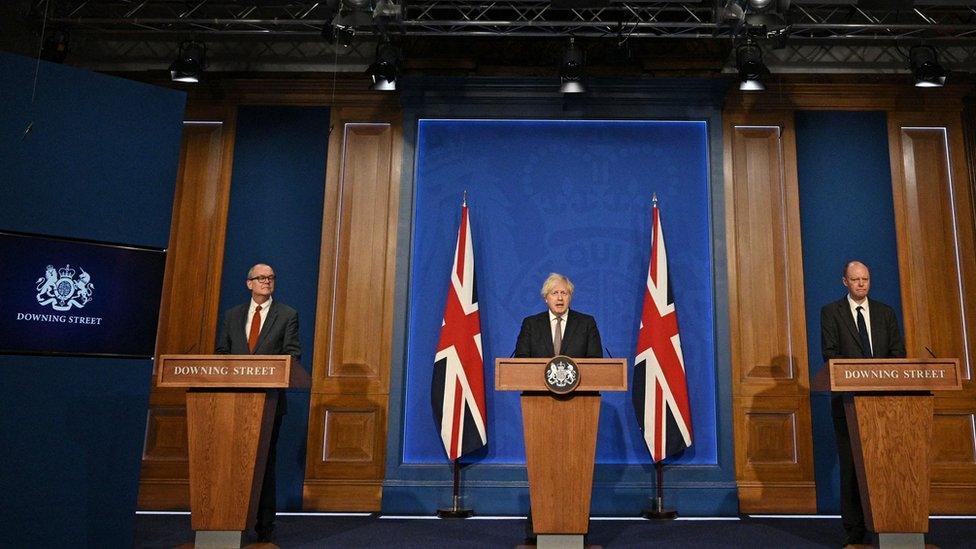Covid-19: Prime Minister announces details of lockdown easing plans
- Published
- comments

Prime Minister Boris Johnson and two of his leading medical advisors addressed the country
Prime minister Boris Johnson has set out the details of the final stage of England's journey out of lockdown. Step four was delayed last month to no earlier than 19 July.
The government has explained plans to get rid of the laws requiring people to wear face masks, and maintain social distancing.
When step four goes ahead there will be no limit to the number of people who can meet up indoors or outside and adults will no longer have to work from home.
The final decision on whether or not England will move into step four will take place on 12 July.
Face masks will no longer be legally required
The 1m-plus social distancing rule will end
All legal restrictions on numbers meeting indoors and outdoors will be removed
All businesses, including nightclubs, can reopen
Table service rules at bars and restaurants and venue check-in requirements will be scrapped
The limit on the number of named visitors to care homes will be lifted
Capacity limits for concerts, theatres and sports events will also be removed
Guidance instructing people to work from home where possible will be lifted
Council powers to enforce rules will expire
Does this mean things will go back completely to normal?
In his speech Boris stressed that the pandemic is "far from over and won't be over by 19 July".
Some Covid-19 protection measures, such as wearing masks in enclosed places, may continue but it will be up to people to decide whether or not they want to wear one.
What news was there about schools?
An update on the possible removal of school bubbles, will be shared on Tuesday when the Education Secretary is expected to announce introducing plans for increased testing instead of isolation for close contacts of people who have caught the virus.
The Joint Committee on Vaccination and Immunisation is also looking into information to decide whether or not children will be offered vaccinations.
Will lockdown rules in England change on 19 July?
Downing Street said the final stage of lockdown easing in England would go ahead on 19 July only if the government's "four tests" for easing restrictions had been met.
Those tests are:
1. That the vaccination programme is going well.
2. That the number of people being admitted to hospital or dying of coronavirus continues to fall.
3. That there is reduced pressure on the NHS.
4. That there are no issues with new variants of the coronavirus which could impact the effectiveness of the vaccine.
On Monday 27,334 coronavirus cases were reported across the UK, Boris Johnson also warned that cases are predicted to rise to 50,000 a day later this month.
WATCH: How to cope when things are uncertain?
The government's decision on whether those tests have been passed will be confirmed on 12 July following a review of the latest data.
More than 63 percent of the UK adult population has now received a second vaccine dose, with 86 percent having now received at least a first dose, latest figures showed.
No 10 has said the government is ensuring preparations are in place to offer third "booster" doses to everyone aged over 50 and the most vulnerable over the winter months.
What's happening in Scotland, Wales and Northern Ireland?
Scotland, Wales and Northern Ireland are in charge of their own coronavirus rules.
The next lockdown review in Wales will be on 15 July where ministers have said people would need to "learn to live" with Covid.
Some rules in Northern Ireland have eased, with another review due on 8 July.
It is expected that all parts of Scotland will be in level zero from 19 July and that more restrictions can be removed on 9 August, including lifting the legal requirement to physically distance indoors.
The First Minister Nicola Sturgeon also said: "There will still be some ongoing need for face coverings, for example on public transport and in retail."
- Published15 June 2021
- Published7 June 2021
- Published4 June 2021
